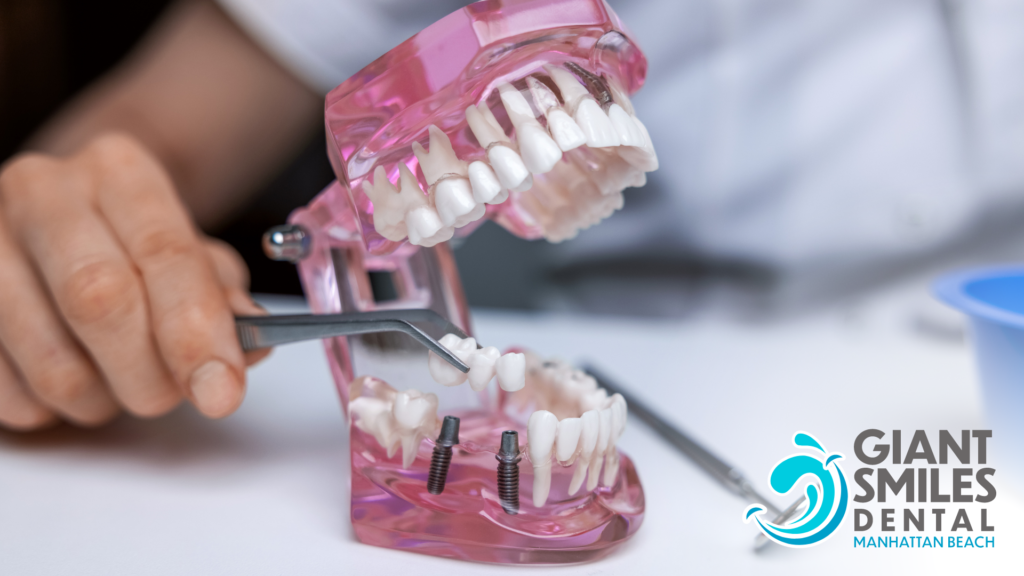CEREC Manhattan Beach

Dental bridges in Manhattan Beach, CA stand as a dependable and commonly employed method in restorative dentistry to effectively fill the gaps left by missing teeth. Neglecting these gaps can lead to tissue damage, misalignment, and further oral health issues. At Giant Smile Dental, we specialize in providing tailored dental bridges as a durable solution for tooth replacement, ensuring your smile remains both complete and healthy.
Understanding How Dental Bridges Function
A dental bridge serves as a fixed, non-removable solution designed to replace one or two adjacent missing teeth. It securely attaches to the natural teeth surrounding the gap, utilizing porcelain crowns as anchors.
Mimicking the appearance and functionality of natural teeth, dental bridges restore your smile, enhancing your confidence and allowing you to eat and speak without concern. This procedure typically requires two visits to complete, under the expert care of Dr. Greg Ray. Here’s an overview of the process:
- Initial Dental Examination: Dr. Ray begins with a thorough dental examination to assess your oral health and determine your suitability for a dental bridge. Should any underlying issues such as gum disease be identified, these must be addressed and resolved prior to proceeding.
- Preparation Phase: Detailed impressions are taken and, along with digital x-rays and other necessary imaging, sent to the lab to fabricate your custom bridge and crowns. The teeth adjacent to the gap are prepared to ensure a snug fit for the crowns, which support the bridge. Temporary crowns are placed while your custom bridge is being prepared.
- Final Restoration: Upon completion, the bridge is carefully fitted to ensure optimal compatibility with your bite and the aesthetic blend with your natural teeth. Once confirmed, the bridge and its supporting crowns are permanently set in place, completing the restoration.
The Importance of Replacing Missing Teeth
It’s a common misconception that losing a back tooth is inconsequential, believing the remaining teeth can compensate for its absence. However, every tooth plays a critical role in your oral health, and missing teeth can compromise the integrity of your bite and jaw. A dental bridge not only enhances your smile aesthetically but also maintains the health and strength of your remaining teeth by preventing them from shifting and causing further complications.
Without a replacement, missing teeth can lead to:
- Shifting of adjacent teeth, causing tissue damage
- Alignment and bite issues
- Jawbone weakening
- Enamel wear
- Instability in surrounding teeth
- Further oral health issues
Cost Considerations for Dental Bridges
Dental bridges offer an economical option for tooth replacement, with several factors influencing the cost:
- The number of teeth being replaced
- The necessity for additional porcelain crowns
- The specific location of the restoration
- Choice of materials
- Concurrent treatments if required
Frequently Asked Questions
1. How long does a dental bridge last?
Dental bridges, with proper care and regular dental check-ups, can last 10-15 years or longer. Their longevity depends on the health of the teeth supporting the bridge and the quality of oral hygiene practices.
2. Is getting a dental bridge painful?
The procedure for installing a dental bridge is typically performed with local anesthesia, making it a pain-free process. Some patients may experience mild soreness or sensitivity following the procedure, which usually subsides within a few days.
3. Can I eat normally with a dental bridge?
Yes, after a short adjustment period, you should be able to eat normally with a dental bridge. It’s recommended to start with soft foods and gradually reintroduce harder, chewier foods as you become accustomed to the bridge.
4. How do I care for my dental bridge?
Dental bridges require the same care as your natural teeth. This includes brushing twice a day, flossing daily (using special flossers designed for bridges), and regular dental check-ups and cleanings to ensure the longevity of your bridge and the health of your surrounding teeth.
5. Are dental bridges covered by insurance?
Many dental insurance plans partially cover the cost of dental bridges. The coverage amount can vary depending on your specific policy. Giant Smile Dental accepts numerous dental insurance plans, and our staff can help you understand your coverage details.



